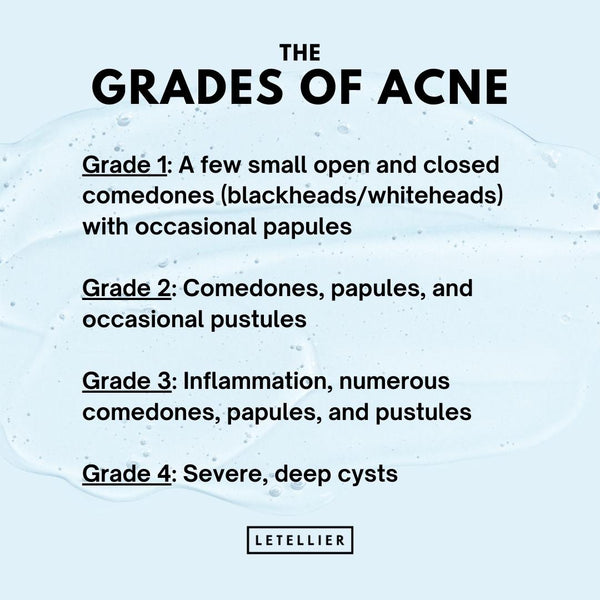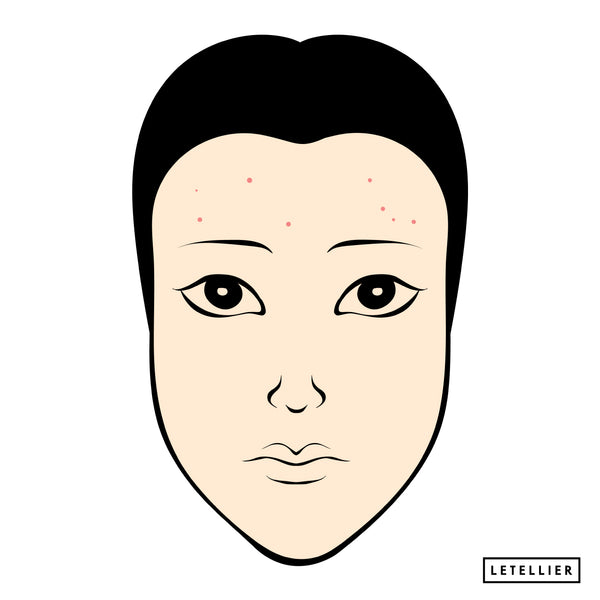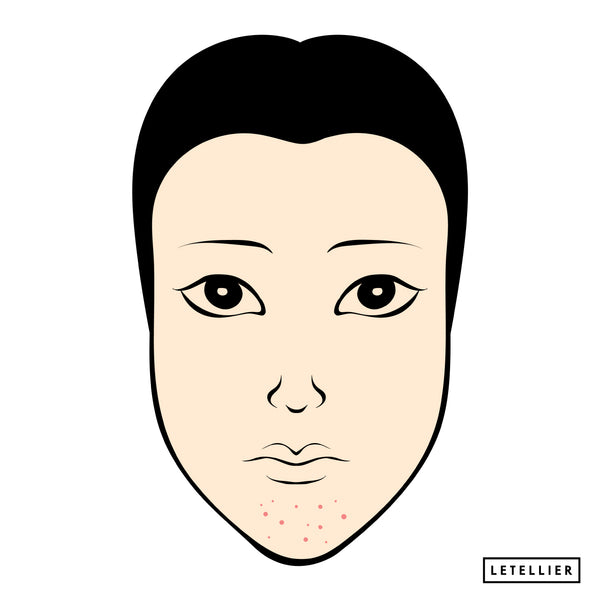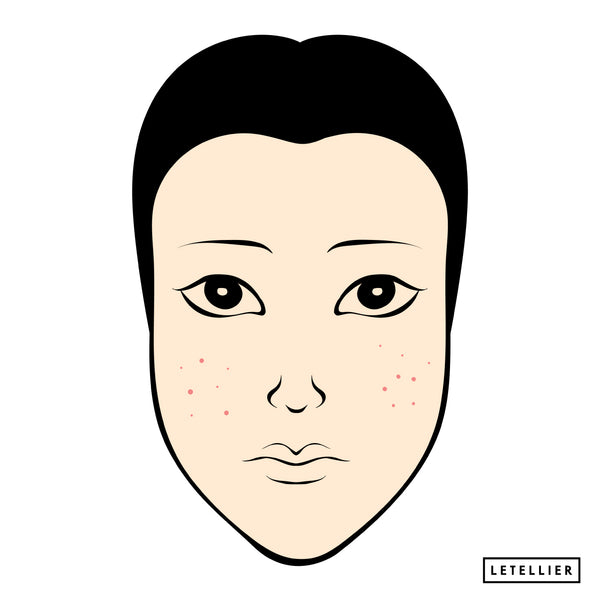Disclaimer: The following tips are not intended to be, or replace, a medical diagnosis.
What is acne?
Acne is a skin condition that results in inflammation and is characterized by symptoms like open or closed comedones (blackheads/whiteheads), papules, pustules, scarring, and in most severe cases, cyst formation. Professionals grade acne on a 4-point scale.

Who gets acne?
Acne affects over 650 million people and is the 8th most common disease globally. It also impacts 85% of teenagers and may continue during adulthood.
When does acne start?
Acne begins at puberty when the body is producing a large number of growth hormones. These hormones stimulate the sebaceous (oil) glands, which causes an overabundance of sebum.
Why do I have adult acne?
According to Traditional Chinese Medicine, the face indicates what’s going on inside. The forehead is linked to the digestive system and stress. By analyzing the skin, we can determine areas of the body that are overstressed or imbalanced. If you break out on your forehead, take a closer look at your water intake, stress levels, and hair products.

Do you drink enough water? Are you under a lot of stress? Do you have bangs?
Breakouts on the chin are associated with the menstrual cycle in women. (Dairy) milk can disrupt the balance of your hormones, which will cause flare-ups on your chin.

Tip: If you break out on your chin, avoid dairy for a few days to help reduce inflammation. Probiotics may also be a beneficial dietary supplement.
Red and inflamed breakouts on the cheeks could indicate food sensitivities or allergies. If you notice acne lesions in that area, ask your primary care doctor to get tested for food allergies. A high glycemic diet is known to worsen acne. Some studies report that daily intake of fruits and vegetables may lower the risk of severe acne.

Tip: Food sensitivities may not show up on an allergy test, so keep a journal and write down what you eat daily. If you want to know if there’s a connection between your breakouts and what you eat, eliminate one of your usual foods for six weeks. If your skin improves, you’ll know that there may be a connection between your acne lesions and what you eat.
Which acne cleanser works best?
Avoiding irritation and selecting non-comedogenic products (that will not clog your pores) are essential when you suffer from acne. Cleanse your skin twice a day with a gentle facial cleanser like The Bare Bar. You may have noticed that it contains coconut oil, an ingredient considered highly comedogenic. The coconut oil in The Bare Bar has been “saponified,” which means it has been turned into a soap molecule and is, therefore, non-comedogenic because it’s no longer oil.
Tip: When cleansing your face, use your hands instead of a sponge. It’s less abrasive. Wash for a few seconds so your skin can absorb the active ingredients, and let the cleanser do the job. Gently pat dry. Don’t rub your skin dry.
I should use which acne serum?
Treat your skin with an anti-inflammatory serum like The Lemon Drop, which delivers acne-fighting ingredients, such as tea tree oil, to bring back harmony to the skin and minimize breakouts. Tea tree essential oil is extracted from the leaves of Melaleuca Alternifolia. Some studies have demonstrated that tea tree oil is as effective as benzoyl peroxide in improving acne lesions. When using tea tree oil, there’s also a lower risk of adverse reactions, like dryness or irritation.
Should I exfoliate if I have acne?
Every other week, you can use natural acids like glycolic and salicylic as they effectively treat acne because of their exfoliating properties. Using a product like The Enzyme Peel will provide gentle exfoliation (unlike scrubs that can be too abrasive) and reduce acne scarring. It contains tartaric and malic acids, two organic acids found in wine that will help smooth skin, refine skin texture, and promote skin absorption of topical serums.
Can makeup cause acne?
If you suffer from visible skin conditions like acne, you’re more at risk of depression and lower self-esteem. Using makeup to hide acne lesions provides a significant emotional benefit. The best makeup for acne skin can help treat and cover the skin without worsening the acne lesions. Our makeup made from natural minerals is non-comedogenic, allows the skin to breathe, and is free of talc. It’s also infused with essential oils like sage to help regulate excessive sebum production and rosemary to fight against the bacteria that causes acne.
What technology is best for acne?
LED Light Therapy has been used and recommended by estheticians. You can use blue LED therapy to reduce acne lesions and kill bacteria on your skin.
Estheticians also use High Frequency, a treatment that uses alternating current and glass electrodes to treat acne-type lesions, improve product penetration and increase circulation.
Can stress and weight gain cause acne?
An increase in stress levels could impact acne flare-ups. Exercising regularly lowers the probability of feeling stressed. Recent studies show that overweight people tend to have higher androgen levels, which could increase sebum secretion, leading to more acne lesions. Exercise helps you look and feel better, stimulates blood circulation, and encourages the proper functioning of organs, including your skin.
Topical and natural solutions are usually the standard for mild to moderate acne. If you suffer from moderate to severe acne, visit your esthetician or dermatologist for more advanced treatments.









